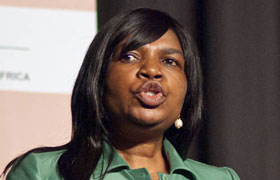
Communications minister Dina Pule said on Monday that she has withdrawn her application for leave to appeal against a high court judgment that found in favour of free-to-air broadcaster e.tv over who will manage the control system for digital terrestrial television.
Speaking at the Digital Broadcasting Switchover Forum in Sandton on Monday, Pule said she has instructed her department to withdraw the appeal against the judgment of the high court in Johannesburg.
“We are committed to finding a solution that will ensure that we fast-track the process of rolling out digital terrestrial television,” the minister said at the forum. “In this regard, I have instructed the department of communications to withdraw our appeal against the South Gauteng high court decision.”
The department said in mid-January that it would file an application for leave to appeal the judgment, which found that the minister had acted unlawfully in instructing that state-owned broadcasting signal distributor Sentech must manage the control system for the digital set-top boxes that consumers need to receive digital signals.
If Pule had pressed on with the appeal, it could have resulted in months if not years of delays to digital migration and the attendant delays in freeing up valuable radio frequency spectrum that can be used to deliver next-generation wireless broadband services.
The control system, sometimes referred to as the conditional access system, is a crucial component in ensuring that set-top boxes comply with a minimum set of standards. It is also meant to prevent, the grey import of cheap alternatives, and the sale of government-subsidised boxes across South Africa’s borders.
High court acting judge CG Pretorius found in December that in handing over management of the conditional access system to Sentech, Pule had overstepped legal boundaries. He awarded costs to e.tv. The judge found that the minister had “no legal power to prescribe or make binding decisions relating to set-top box control” and added that the Independent Communications Authority of South Africa was the only entity entitled to regulate the system.
In late January, there appeared to be a softening in government’s approach to e.tv. This followed a second meeting between the department of communications and free-to-air broadcasters, including e.tv.
The SABC and e.tv have submitted a joint proposal to Pule’s office in which they make recommendations to get over the impasse.
At Monday’s forum, Pule said, too, that Sentech is on track to have more than 80% of South Africa’s population covered with digital broadcasting signals by March. She also said that the Post Office will be responsible for the distribution of government-subsidised set-top boxes. — (c) 2013 NewsCentral Media




